10/10
You will fall in love with this (non) love story
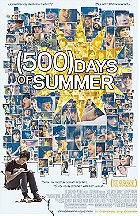 Posted : 15 years, 8 months ago on 22 September 2009 12:02
(A review of (500) Days of Summer)
Posted : 15 years, 8 months ago on 22 September 2009 12:02
(A review of (500) Days of Summer)10/10
 0 comments, Reply to this entry
0 comments, Reply to this entry
Osama probably is hiding from Chuck Norris...
 Posted : 15 years, 8 months ago on 20 September 2009 11:31
(A review of The Delta Force)
Posted : 15 years, 8 months ago on 20 September 2009 11:31
(A review of The Delta Force)
Americans hate terrorism. This is not an audacious statement considering America's "War On Terror" throughout the early 2000s and beyond, but terrorism has been loathed as far back as the '80s. Currently during the early 21st Century, an intricate system of intelligence is utilised to track down terrorists and an intricate system of weaponry is used to blow them to hell. Back in the mid-80s, the Americans didn't have the benefit of such advanced technology... Instead, they relied on Chuck Norris. In 1986's The Delta Force, the Chuckster is portrayed dispatching Arab terrorists using an array of Norris-esque weaponry, ranging from his martial arts skills to large bazookas to a motorcycle that fires rockets. The film is unbelievably cheesy, often unintentionally hilarious, and rather pro-American.
After an introductory combat sequence which demonstrates the skills of the American protagonists, the action moves onboard a large passenger airplane. A pair of Arab terrorists hijack this plane, taking all passengers hostage and ordering the captain to reroute to Lebanon. These terrorists claim to be freedom fighters for a revolutionary organisation, but their cause is unknown...they just have a thing against America. A group of elite American commandos known as the Delta Force - led by Col. Nick Alexander (Marvin) and Maj. Scott McCoy (Norris) - are sent in to save the hostages and restore American honour. Rather than trying their hand at the fine art of negotiation, the Delta Force cut to the chase and pull out the heavy artillery.
The Delta Force was released in 1986; one year after a real-life plane hijacking in Athens. (This was on a TWA plane. In the film the plane which accommodates the hijacking is an AWT plane... clever.) The first hour of this movie is mostly devoted to retelling the events of this hijacking, but the second hour (when the macho Americans show up) has little basis in reality. This final half sends the message home that the best way to execute foreign policy on America's part is to shoot or blow up all terrorist threats. All this gung-ho business is like a different film altogether. It's full Chuck Norris territory: lots of machismo, gunfire and explosions. It's all very patriotic with the Americans saving the day and the hostages singing the American anthem. That's the '80s for you.
Considering this is an '80s action film with Chuck Norris and Lee Marvin, one expects The Delta Force to be chock-full of terrorist ass-kicking goodness and brainless action. Alas, the meaty action doesn't commence until the first hour has passed. Even with a plenty of action as the climax nears, the unusually long runtime of over two hours will prove a serious test of anyone's Chuck Norris attention span. The running time might've been more tolerable if the film provided interesting exposition, a compelling story or meaningful character development...but The Delta Force provides none of this - it's instead packed with filler. Empty threats against obnoxious hostages and hollow, repetitive dialogue does not make gripping cinema.
The Delta Force also exploits blatant stereotypes - there's the disillusioned soldier who returns to action because of his noble sense of duty, the abuse of a kindly priest, and even a pregnant lady who could go into labour at any moment. Meanwhile the terrorists have no legitimate motive or objective. At times, the depiction of these Arab terrorists is borderline racist - they're single-mindedly scheming, vicious, and they look very grubby.
If nothing much else, The Delta Force can be admired for its star-studded cast. Chuck Norris, as usual, just plays himself. The bearded action icon usually delivers his dialogue in a subdued fashion with no great conviction...but he's still watchable. This film marked the final screen appearance of Lee Marvin. He's pretty badass, though he's never given a chance to test his acting abilities. Also in the cast is a Who's Who of B-Movie star-power: Martin Balsam, George Kennedy (star of those Airport films from the '70s), Robert Forster (sporting dark hair, dark skin, a little moustache and a thick accent as the head Arab terrorist), Robert Vaughn, Shelley Winters, Steve James, Bo Svenson, and many others. The direction by Menahem Golan is adequate, and Alan Silvestri's score alternates between intense and cheesy power pop.
All in all, The Delta Force is your standard American cheerleading propaganda flick, with Chuck Norris and Lee Marvin holding the pompoms. The action is at times thrilling and the novelty value of seeing the Chuckster in '80s mode never wears off, but that's all there is to this one. For a film which lacks anything even resembling an intricate story or deep characterisations, there sure is plenty of talking. And considering this is a Chuck Norris movie, this is a problem. There's a far more agreeable 80-minute actioner lying somewhere within this somewhat tedious 125-minute feature.
4.9/10
 0 comments, Reply to this entry
0 comments, Reply to this entry
Missing Brains... Plenty of Action...
 Posted : 15 years, 8 months ago on 19 September 2009 09:10
(A review of Missing in Action)
Posted : 15 years, 8 months ago on 19 September 2009 09:10
(A review of Missing in Action)
As soon as the movie industry felt the dust of the Vietnam War had settled, a deluge of Vietnam-related movies started pouring in. There were films such as Apocalypse Now, The Deer Hunter and Platoon which handled the source material respectfully. But the mid-late 1980s was the era of bazookas, guns and superhero-style action heroes. Once First Blood was released, a string of films flooded the market that attempted to transplant the history of the Vietnam War into the '80s action format. Furthermore, the subject of American soldiers left behind in Vietnam functioned as a catalyst for several '80s action flicks (Rambo: First Blood Part II being the most prevalent). The Chuck Norris vehicle Missing in Action was one such movie. This isn't the most egregious entry in this particular sub-genre, but it's hardly a classy fare. This is just your typical Chuck Norris romp: there's action, nudity, one-liners, stunts and a few moments of pure fantasy. And best of all, it's fun!
For this film, the Chuckster plays an American officer named James Braddock who spent several years at a Vietnamese Prisoner of War camp and believes there are still American soldiers being held captive in Vietnam. The plot, such as it is, involves Braddock returning to Vietnam in an attempt to locate a POW camp. With assistance from an Army buddy (in the form of M. Emmet Walsh) and an assortment of weaponry, Braddock ventures deep into the jungle to free the American MIAs.
Cue perfunctory explosions, action sequences, and lots of 'all gooks are villains' propaganda. The other actors featured in this movie function as mere props for Chuck Norris to dispose of in whatever way he sees fit. The only character who's even mildly developed is Braddock since the supporting characters merely make an appearance to move the story along before curiously vanishing. The film's attitude towards Vietnamese soldiers and officials is borderline offensive since they're depicted as unequivocally shifty, villainous and deceitful... But on the other hand, this is the 1980s! This is the age of cartoonish stereotypes!
The Chuckster is grudgingly assisted here by a woman at the U.S. Embassy in Vietnam (who seems like she was intended to be a love interest, but no real romance ever occurs...), and an ex-colleague who hooks him up with a bunch of backstreet arms dealers. Inexplicably, these arms dealers possess a large cache of machine guns as well as a helicopter and a bulletproof raft in a tiny storage room. It's also peculiar that Braddock just happens to have the thousands of spare dollars necessary to purchase all this expensive equipment. But then again, a viewer isn't supposed to question the plot - Missing in Action is about the action and violence, not a sensible storyline or anything deep.
And my word, it delivers in the action department with commendable aplomb. Gear yourself up for an unrelenting onslaught of rousing shootouts, car chases and explosions, with Chuck Norris in the midst of it all in regular Chuck Norris mode. Director Joseph Zito (who later collaborated with the Chuckster for Invasion U.S.A. in 1985) manages the action adeptly, though these aren't the most spectacular set-pieces you’ll ever witness. Jay Chattaway's accompanying score is of the usual '80s standard; combining the tense with the cheesy (though patriotic music is in surprisingly short supply). All of this stuff combines to generate an engaging escapist romp guaranteed to leave a smile on the face of any action fan.
It's possible to watch a Chuck Norris vehicle like Missing in Action and come away with the misimpression that the bearded hero has not said a word. He occasionally talks, of course, but his eloquence is strictly physical. Norris (with his minimalist, taciturn acting style that often earns him substantial criticism) has never displayed any genuine acting ability, but he's skilful enough to carry a simple, bullet-riddled, crowd-pleasing action movie like this one.
Norris' celebrated martial arts skills don't feature very prominently in this escapade. Instead, he mostly relies on machine guns or grenades. The iconic moment of Missing in Action depicts Norris rising out of a river in slow motion (looking suitably ferocious in green fatigues and a matching headband, along with his M-60) and blowing holes in three soldiers who made the grave mistake of laughing at him.
The moral of this story is clear: if a government denies a widely-believed possibility, they run the risk of Hollywood green-lighting a string of B-Grade films about it. Those who genuinely hate Missing in Action, perceiving it as jingoistic or racist propaganda, are missing the point of the film completely - it was never intended to be anything provocative or liberal...it's just a good old-fashioned guy flick featuring Chuck Norris who's a formidable adversary for the Vietnamese enemy.
Interestingly, if one watches the credits you'll see a certain Jean-Claude Van Damme listed as a stuntman.
5.9/10
 0 comments, Reply to this entry
0 comments, Reply to this entry
Standard, enjoyable '80s Action flick
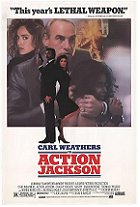 Posted : 15 years, 8 months ago on 14 September 2009 12:25
(A review of Action Jackson)
Posted : 15 years, 8 months ago on 14 September 2009 12:25
(A review of Action Jackson)
Action Jackson is pure '80s blaxploitation - plenty of savagery, sex and sinew with a predominantly African American cast. The crowd-pleasing meatloaf at the centre of this macho action film is neither Stallone nor Schwarzenegger, but their former sidekick Carl Weathers instead. If you're familiar with the movies of maverick '80s super-producer Joel Silver, you'd have an accurate idea of what to expect from Action Jackson: there are shootings, stabbings, flaming corpses, broken bones, explosions, careening vehicles, and a nourishing dose of humour in the form of snappy one-liners. Fans of '80s action romps are destined to enjoy it.
Jericho "Action" Jackson (Weathers) is a Detroit police sergeant with an apparent inability to control his actions during heated situations (hence his notorious moniker). Jackson is pitted against esteemed car magnate Peter Dellaplane (Nelson) who's suspected of masterminding a murder spree against local officials from the auto workers' union. In typical action film fashion, Jackson dashes from clue to clue, and is framed for murder. With Dellaplane's mistress Sydney (Vanity) in tow, Jackson sallies forth to prevent an assassination, vindicate himself and bring down Dellaplane, all the while facing plenty of opportunities to live up to his titular nickname.
One thing's for certain: Action Jackson wastes no time before pumping up the noise levels. Five minutes into the movie, a flaming corpse plummets from a high-rise and smashes through a glass ceiling. Alas, the action subsequently takes a backseat while the film focuses on plot and characters. Unfortunately, the plot is hackneyed and the characterisations remain one-note. Despite clocking at a mere 90 minutes, the film feels unusually bloated since quality action sequences are on the short side. There's a bit too much flab.
Make no mistake: Action Jackson is a no-brainer action film. It's overflowing with so many genre conventions that it's almost as if the screenwriter had a checklist beside him while penning the script. Utterly useless policemen? Check. Slipshod depiction of police procedures? Check. A few opportunities for the buff hero to remove his shirt and display his impressive physique? Check. Amusing one-liners just prior to the death of a bad guy? Check. The list is endless. This is a strictly by-the-numbers fare. Action movie enthusiasts will be able to predict every beat, and any casual movie-goer will be able to foresee the outcome for any conflict that arises. Action Jackson is also irretrievably unrealistic. The bad guys are unable to shoot straight, characters turn up at the most convenient time, and so on. It's all quite hopeless.
Gripes notwithstanding, Action Jackson is very enjoyable - it's a straightforward, brainless B-Movie blast of entertainment. One-time stunt maestro Craig R. Baxley's direction lacks the oomph to convincingly propel the movie out of the doldrums, but he gets the job done. As to be expected from a product of the '80s, a lot of the action is clichéd stuff (for instance cars just happen to run into trucks hauling flammable tanks which are just eager to burst into fiery goodness).
Carl Weathers had a single note to play as Jericho Jackson, and he plays it terrifically with all the necessary charisma. However Weathers lacks presence, and isn't intimidating enough. R&B singer Vanity is passable as Sydney, and she's given a few chances to prove that her singing skills outshine her acting abilities. Unfortunately, the budding romance between Sydney and Jackson feels obligatory and unnatural. Craig T. Nelson is a serviceable villain, though he's nothing remarkable. Sharon Stone also appears for a brief period, and she's there purely to look nice (a job she accomplishes well). There are a bunch of other actors who make cameo appearances, including two of Weathers' Predator co-stars (Bill Duke and Sonny Landham), an '80s James Bond villain (Robert Davi), and two actors who played terrorists in Die Hard (Dennis Hayden and a very recognisable Al Leong).
Action Jackson is an enjoyable guilty pleasure. It's packed with genuine '80s flair and dubious plot holes, in addition to explosions, stunts and special effects. It's a shame, then, that the film is only ever-so-slightly exciting.
5.9/10
 0 comments, Reply to this entry
0 comments, Reply to this entry
Pedestrian, albeit enjoyable remake
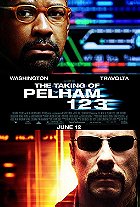 Posted : 15 years, 8 months ago on 11 September 2009 02:04
(A review of The Taking of Pelham 123)
Posted : 15 years, 8 months ago on 11 September 2009 02:04
(A review of The Taking of Pelham 123)
The modern Hollywood remake train continues unabated with The Taking of Pelham 1 2 3; flash-over-substance specialist Tony Scott's reimagining of the crackling 1974 suspenser of the same name. In a sense, The Taking of Pelham 1 2 3 is similar to riding the subway: it moves forward at a decent pace, hitting all anticipated stops before reaching a predetermined destination. In other words, it's a suspense movie without any real surprises, twists or turns. Scott also imposes his signature bag of visual tricks - there's incessant camera movement as well as plenty of random zooms, seizure-inducing edits, bleary slow motion, and other assorted forms of superfluous visual assault. However, to the credit of Scott and screenwriter Brian Helgeland (whose name appears on about as many good films - Mystic River, L.A. Confidential - as bad ones - Sin Eater, The Postman), the story (essentially a psychological thriller) is not transformed into a brain-dead action film. The preposterous climax notwithstanding, this movie is light on pyrotechnics and special effects, and it's surprisingly low-key. Happily, too, it's an engrossing, enjoyable summer flick.
Just like its 1974 predecessor, The Taking of Pelham 1 2 3 disposes of anything resembling a setup. By the time the opening credits have elapsed, a sociopath who calls himself Ryder (Travolta) and his gang (Guzmán, Gojcaj, Vataj) have hijacked subway train Pelham 123. They take eighteen hostages in the first carriage (letting loose the inhabitants of the other carriages) before Ryder makes his demands known to the MTA: he wants $10 million in cash in an hour or he'll begin executing hostages. Walter Garber (Washington) is the unlucky dispatcher on duty at the time of the hostage-taking, and Ryder refuses to talk to anyone but him.
The Taking of Pelham 1 2 3 is the third cinematic incarnation of John Godey's 1973 novel (Joseph Sargent's 1974 movie being the first, and a 1998 television movie being the second). Suiting up the premise for a big-budget modern realisation is understandable since Helgeland is able to alter the original characters and their motivations, as well as updating the concept with modernised plot points (such as one involving a webcam). It's a shame, then, that Helgeland's script lacks surprises. The story has been bled dry of tension due to repetition, so its rote nature is disappointing.
The main divergence between The Taking of Pelham 1 2 3 and the 1974 original is that the characters are mined for additional depth here. In the original, Walter Matthau and Robert Shaw played simple roles (a hard-working cop and a bitter ex-military type), and their communications often centred on the transaction at hand. In this remake, Garber is given a wife and back-story, while Ryder has a history which reveals his motives (it's unfortunate that cinematic villains must always be explained so elaborately in this day and age, which detracts from the mystery and consequently most of the menace). In addition, the banter between Garber and Ryder is too draggy here. Their discussions about religion add a nice dimension to their relationship, but it's ultimately a lazy way for the villain to let slip personal information which will only undermine him later. At least Helgeland had the good sense to incorporate a nourishing dosage of wit during these lengthy passages of dialogue.
Meanwhile, Ryder's accomplices unfortunately lack distinctive characterisations and names barely stick (the original film gave them memorable colour-coded names - Mr. Grey, Mr. Blue, etc - which was recycled by Quentin Tarantino for Reservoir Dogs). Depiction of the hostages is slipshod in the film as well - clichés are thick (mother and son, the token black guy, etc) and ideas are inadequately explored (talk of taking control of the situation is limited to a few seconds of cheesy discussion).
Another small annoyance with The Taking of Pelham 1 2 3 is Scott's trademark visual style. To his credit, Scott has actually dialled down his style to an extent for this project (certainly, it isn't as indecipherably jittery as Domino). Following an almost unbearable opening sequence swarming with stylistic overkill, Scott settles down and shows a bit of restraint for the quieter moments. Harry Gregson-Williams' supplementary score is suitably intense, though it lacks the memorable zing of the theme from the 1974 original.
Much of the movie consists of tense verbal standoffs between Garber and Ryder, but Scott does play up the action when available. Most detrimental is the reworked climax which not only deviates from the simple, effective brilliance of the original's finale, but also employs the tritest of clichés: a chase sequence. Other elements, such as gratuitous car crashes (which are very crashy), are included to maintain some level of excitement, but they're easily spotted as slapdash audience response gimmicks. Worse, characters are usually shot in unrealistic hails of bullets (after being shot ten times, characters are still moving). Also, for no reason at all, Garber eventually morphs from humble civil servant and family man to a gun-waving, car-stealing John McClane emulation.
Where Robert Shaw's performance in the original film was calm and chilling, John Travolta plays Ryder like a bipolar bulldog with rabies. The actor was clearly treasuring the opportunity to depict an unhinged lowlife, but his exuberance borders on camp, with his verbal diarrhoea, overzealous shouting and wild gestures far too over-the-top and theatrical for the character. His utterance of the word "motherfucker" is extremely overdone (he also sounds contrived every time he says it). At the other end of the radio, Denzel Washington (who gained a bit of weight for the role) plays Garber as the quintessential everyman. It's an effective, low-key performance infused with humanity.
In the supporting cast there's James Gandolfini who's amiable as the Major, and John Turturro who submits an above-average performance as a professional hostage negotiator.
The Taking of Pelham 1 2 3 is not a bad film by any stretch, but it also isn't the great film it had the potential to be. Compared to the 1974 original, this reimagining is shakier, shootier, shoutier, swearier, crashier, and isn't surprising enough. Yet despite its flaws, it's also enjoyable.
6.2/10
 0 comments, Reply to this entry
0 comments, Reply to this entry
An Inglourious Film...
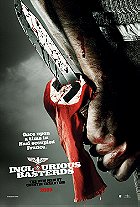 Posted : 15 years, 8 months ago on 10 September 2009 01:49
(A review of Inglourious Basterds)
Posted : 15 years, 8 months ago on 10 September 2009 01:49
(A review of Inglourious Basterds)
If there's one consistency in Quentin Tarantino's cinematic oeuvre, it's that he never delivers exactly what you'd expect. 2009's Inglourious Basterds is no exemption to this. The fact that the title of Tarantino's revisionist World War II fantasy is intentionally misspelled can perhaps be best perceived as a subtle hint that the movie itself is nothing like most imagined it to be. Neither the sweeping war movie nor the orgy of ultra-violence its title and marketing suggests, Inglourious Basterds is a talky drama that centres on a variety of coincidentally-connected characters during WWII. Unfortunately, too, this isn't the masterpiece one would have expected either. Clocking in at approximately 150 minutes, this is an unforgivably leisurely, almost glacial feature that loses its way in the thickets of alternative history and dialogue. Most importantly, this is not a movie about history or war, or anything of substance or meaning - it's a movie about movies & influences. For all its visual bravura and sporadic bursts of brilliance, it simply feels trivial.
Inglourious Basterds is divided into a number of titled chapters, with the main narrative focus split into three. One of the plot strands focuses on the Basterds; a group of bloodthirsty Jewish-American GIs under the command of Lt. Aldo Raine (Pitt) who spread fear throughout the Third Reich by brutally killing Nazis. Another focal point of the plotline is a fugitive Jewish woman (Laurent) who lives incognito in Paris and owns a movie theatre. The story also concerns a German SS Officer known as "The Jew Hunter", Col. Hans Landa (Waltz).
Nominally, Inglourious Basterds is about the titular troupe of commandos conducting raids throughout occupied France. But in actuality, the movie is a self-indulgent compilation of Tarantino's inspirations. In fact the Basterds themselves hardly appear in the film since Tarantino instead continues to obsess over wronged females seeking bloody vengeance (a trend he started with Jackie Brown, then exhausted with Kill Bill and Death Proof). The short screen-time of the Basterds would be more forgivable if they were replaced with interesting characters. Alas, the film spends more time with a bunch of boring, cardboard characters as a substitute. By the time all the multiple plot strands interlace for the finale, it's tough to care about what happens to any of the characters.
Tarantino has never been one to be succinct when he can masturbate through endless pages of self-indulgent, referential dialogue. The basic formula for a chapter is simple: a pointlessly long conversation takes place that acts as a precursor to a short burst of violence. The problem with this formula is that the dialogue rarely offers any effective characterisation...it's all gratuitous filler without any relevance to the story instead. (At one stage, characters converse for at least 40 minutes before they're all gunned down. And the point of that was...?) Each segment drags on for far too long until you no longer care about who's in danger or what's at stake. The necessity of such excessive chatting is especially questionable when the outcome is predictable.
Inglourious Basterds is just a radically undisciplined movie since Tarantino wanted the film his way and can never bear to cut a frame. He's unable to understand relationships in the movie industry too; in fact his most profound relationship is with himself. This is primarily reflected in the fact that he never hires a composer because he doesn't want another person to have that much influence on his work. The soundtrack for Inglourious Basterds is therefore pilfered from various sources, and the result is often jarring. Spaghetti-western music (ala Ennio Morricone) is used for an establishing shot of a French farmhouse, and a 1980s David Bowie song plays over a scene happening in 1940s Paris.
Sly winks pervade the movie as well. At the premiere for the latest Nazi propaganda movie, Hitler tells Goebbels "This is your finest film yet". The last line of the movie is perhaps the most significant wink - "I think this might just be my masterpiece", Aldo quips.
Moments of brilliance are contained within Inglourious Basterds which remind a viewer just how excellent Tarantino can be as a writer and director. Take for instance the brilliantly executed opening sequence in which Col. Landa interrogates a French dairy farmer about the whereabouts of his Jewish neighbours. At around half an hour in length, this dialogue sequence is sustained by the relentless tension Tarantino manages to conjure up. Also noteworthy is the movie's surreal inferno of a climax which rewrites history with such operatic verve that it's difficult not to get swept up in its ludicrous exhilaration. Other excellent segments can be found here and there as well (such as the hilarious Mike Myers cameo). In essence, the film is about 50 minutes of magnificence that's tragically squandered by the 100 minutes of boring, pointless filler surrounding it.
As for the cast... Christoph Waltz as Col. Landa is an excellent find. His performance itself (which earned him an award at Cannes) is effortlessly charming, while the character is one of the film's only three-dimensional creations (though his sudden change of heart in the final 15 minutes feels contrived and at the convenience of the plot). The role called for an actor with the linguistic ability to speak French, German, English and Italian, and Waltz delivers with aplomb.
Unfortunately, none of the Basterds are badasses; they're plain, unremarkable caricatures. Brad Pitt underwhelms as Aldo Raine, while scenes featuring Eli Roth's minor character unfold like outtakes from Hostel. Diane Kruger is note-worthy as an undercover German actress who helps the Basterds.
Mélanie Laurent is worth a mention; she submits a top-notch, immaculately nuanced performance as a beautiful young Jewish fugitive. Meanwhile Der Führer and Joseph Goebbels, played by Martin Wuttke and Sylvester Groth (respectively), are portrayed as cartoonish buffoons.
Somewhere in the midst of the overstuffed Inglourious Basterds lies two very enjoyable movies - an enjoyable, 89-minute slice of exploitation cinema and a potent war drama. When merged together, the result is two main stories connected by contrivances. All things considered, Inglourious Basterds is one of Tarantino's least-focused films to date. The director has paid so much attention to the film's peripherals that he has neglected to provide a centre worth embracing. While one can appreciate and (to an extent) enjoy what Tarantino has achieved here, one must wonder if a more Dirty Dozen-style action film (tailored for Arnie and Sly, as originally intended) would have yielded a better overall experience.
5.4/10
 0 comments, Reply to this entry
0 comments, Reply to this entry
Amusing cookie-cutter rom-com
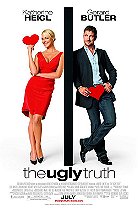 Posted : 15 years, 8 months ago on 9 September 2009 02:43
(A review of The Ugly Truth)
Posted : 15 years, 8 months ago on 9 September 2009 02:43
(A review of The Ugly Truth)
Hollywood, it would seem, has grown unable to produce a great romantic comedy. With the modern studio system predominantly concerned about making money through minimal effort, you'd be hard-pressed to encounter a studio-produced rom-com which doesn't adhere to as many genre clichés as possible. The Ugly Truth is a perfect example of a generic romantic comedy from the Hollywood factory. It's also more or less a lazy rehash of practically every element of 1989's When Harry Met Sally (with similar protagonists, similar sex jokes and an analogous perspective on relationships). But at any rate, the creators of The Ugly Truth (including three female screenwriters - God help us!) had the decency to set it apart from the uninspired rom-coms of recent memory with some material that's funny and a commentary on men & women that's fairly accurate (if a bit hackneyed). Beyond this, however, The Ugly Truth is a cookie-cutter movie, and the cookies are rather stale.
The female protagonist of this story is ambitious, romantically-challenged TV producer Abby Richter (Heigl). When the ratings slump for Abby's morning show, the station manager hires Mike Chadway (Butler) to increase the show's popularity. Mike is the host of a television program who offers insights into the primal male psyche. Abby detests Mike and his philosophies, but he becomes an instant TV sensation. Meanwhile, Abby takes a liking for her hunky new neighbour Colin (Winter). When she becomes cornered, Abby grudgingly agrees to let Mike help her court Colin and prove his theories on relationships along the way.
The set-up is painfully familiar - boorish everyman who doesn't believe in deep relationships meets fussy professional woman seeking true love. They initially loathe one another, but opposites attract in the world of romantic comedies. The story, in other words, is nothing unprecedented. The Ugly Truth stays inside the lines; making sure the eternally single girl lives with a cat, and the dream date has the perfect physique. With a trio of women credited with penning the screenplay, one would hope for some smarter feminist positioning. But alas, the film holds true to every hoary moviemaking chestnut; from the best friend who lives vicariously through the heroine to the obligatory music montage which implies the growing bond between guy and gal. The concepts of subtlety and nuance are discarded, as is the very concept of innovation.
But The Ugly Truth is admittedly hilarious - not consistently so, but there are enough laughter-inducing scenes to keep things from becoming tedious. The scenes that grant Mike the freedom to talk about relationships and sex are frankly hilarious. There's a glut of other comedic set-pieces as well (such as a predictable incident in a restaurant involving vibrating underpants). Since the filmmakers amplify the crudity factor, your enjoyment of The Ugly Truth will depend on your taste in romantic comedies and tolerance for vulgarity. The film is about as review-proof as any teen-oriented blockbuster.
Another of the film's strengths is the way it pokes holes in the romantic illusions between men and women that should prove fascinating for both genders. The film suggests that while women possess a mental checklist for the perfect man and spend their leisure time reading books about men, men are in fact very basic with their genitals acting as their guiding compass.
The star of the show is Gerard Butler, who's clearly having fun with his character of Mike Chadway. He's rakish, frank, eccentric and roguishly charming without even trying. Above all, he's an absolute riot and he confidently keeps the film afloat throughout the rough patches. It's a tour de force of a performance. At the other end of the spectrum, Katherine Heigl (who executive produced with her mother) is merely adequate, and seems a tad stale alongside the excellent Butler.
Cheryl Hines and John Michael Higgins are terrific and under-utilised as the married co-anchors of Abby's news program. Bree Turner has some great moments as Abby's romance-starved assistant, and Eric Winter is as good as possible considering he's playing a cardboard cut-out of a character. Nick Searcy is also noteworthy as the TV station's beleaguered manager.
It's a common belief that the central characters of a romantic comedy must be likable in order for the movie to work. But in the real world, there are detestable individuals who still manage to find love. It'd be a real achievement if a bunch of filmmakers were able to make a smart, funny rom-com which involved a contemptuous person searching for love. This would be an effective way to shake up the weary formula. The Ugly Truth had the potential to be that particular movie, but it ends up playing it safe; sticking to the tried and true rules of the genre. There's at least some fun to be had with this by-the-numbers romantic comedy though, and the humour (sophomoric as it often is) relieves some of the boredom of this generic love story.
6.2/10
 0 comments, Reply to this entry
0 comments, Reply to this entry
A Wild Film Noir...
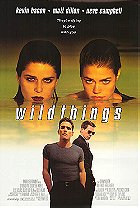 Posted : 15 years, 9 months ago on 22 August 2009 08:56
(A review of Wild Things)
Posted : 15 years, 9 months ago on 22 August 2009 08:56
(A review of Wild Things)
Directed by John McNaughton (who arrived on the scene in 1989 with the low-budget shocker Henry: Portrait of a Serial Killer), Wild Things is a twisty, lurid Southern noir tale of sex, scandal and devious plotting. It doesn't take itself too seriously (ala Showgirls), but neither does the film sink into complete camp. Wild Things instead resides somewhere in the middle, and the product is amusing, shocking, erotic and inarguably engrossing.
Because the plot secrets are key to the movie's enjoyability, only a brief outline of the basic set-up will be included in this review.
The story unfolds in the South Florida town of Blue Bay, and centres on a high school guidance councillor named Sam Lombardo (Dillon). Sam's life is turned upside down when he's accused of rape by manipulative rich girl Kelly Van Ryan (Richards) and trailer-trash bad-girl Suzie Toller (Campbell). Since these two girls are established enemies at school and couldn't have conspired together, the case seems airtight. But is it?
The case goes to court (with Billy Murray starring as Lombardo's cut-rate attorney), but with the case ostensibly solved at the halfway mark, one can be sure nothing is as it seems. After the trial, Wild Things spirals into a web of deceit, murder, and double and triple-crosses. The screenwriter (Stephen Peters) juxtaposes passion and ambiguity, and he becomes so delighted with the power of an expected twist that he endlessly doles them out throughout the film's final half hour. The story eventually becomes so complex that the movie backtracks during the closing credits to provide an explanation of how key moments transpired. Even the most meticulous road map of the story will lead one hopelessly off-course - it's not that the script cheats, but it provides sufficient information to let us to arrive at the wrong conclusion. On top of all this, Peters manages to continually pull the rug out from under the audience without the twists ever feeling contrived.
If there's one aspect where Wild Things falters, it's in the writing of the characters. The actors themselves are exceptional, but the on-screen individuals they're playing are superficial creations devoid of genuine depth. The movie feels underdone at a sleek runtime of roughly 105 minutes, and it would've been beneficial if the lead-up to the preliminary rape allegation was padded out with additional character development.
Because Peters' script contained no shame and no pretensions, director McNaughton was free to take the material to its limits. A screenplay like this deserved the full treatment, and McNaughton came through - any opportunity he was given to be overtly sexual or leeringly sensationalistic, he went for it. Elegantly shot by cinematographer Jeffrey Kimball and magnificently scored by George S. Clinton, Wild Things is afforded a glossy, unreal quality that nicely dovetails with the pulse of the drama.
Of course, the primary draw of this film is the girl-on-girl action courtesy of Denise Richards and Neve Campbell. It's cinematic bliss. Richards (previously seen battling bugs in Starship Troopers) is an actress of decidedly limited range, but she can act sultry and seductive without destroying the illusion that she's a seventeen-year-old. The fact that an adult can pass convincingly as a teen is key to the movie's success. Campbell is sublime; turning in a flawlessly nuanced performance as a dark, rebellious teenager. She sadly had a no-nudity clause in her contract, though, which cuts down the impact of one of the film's key sequences (it's also just plain irritating that we don't get to see her naked).
Matt Dillon and Kevin Bacon constitute the other two key members of the cast. Dillon is perhaps too handsome to be taken for a high school counsellor, but he's nonetheless effective as Sam Lombardo. Our sympathies are with Dillon from the outset, and these emotions come into play when the film begins to throttle towards its climax. At the opposite end of the spectrum, Bacon as the suspicious detective is nothing short of outstanding. Finally, there are supporting roles filled by Robert Wagner, Theresa Russell, Jeff Perry and Bill Murray. Murray is particularly hilarious as Lombardo's lawyer: he's both very sleazy and more competent than his modest office might suggest.
Wild Things is more or less Double Indemnity with a young cast which features undercurrents of erotica, black comedy and noir. This is a terrific film, and it's a lot of fun watching the story reveal the characters' complex machinations. Much fuss has been made about the nudity, but none of it feels gratuitous because it's all in keeping with the sordid, ugly and immoral constitutions of the characters. The narrative is so engrossing that one will care more about the storytelling than the sex. If you can tolerate a bit of artful sleaze, you can't do much better than this.
7.9/10
 0 comments, Reply to this entry
0 comments, Reply to this entry
Solid action movie
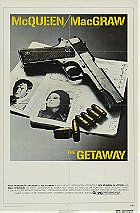 Posted : 15 years, 9 months ago on 21 August 2009 06:37
(A review of The Getaway)
Posted : 15 years, 9 months ago on 21 August 2009 06:37
(A review of The Getaway)
Under the direction of Sam Peckinpah (who's also responsible for the amazing Western The Wild Bunch), The Getaway is both an excellent anti-hero action movie and a solid character study. This 1972 film is often considered one of Peckinpah's most commercial projects, but it nevertheless bears the director's distinctive stamp: a terrific opening sequence, proficient editing, and restrained bursts of violence. While it ranks a few notches below Peckinpah's more acclaimed efforts, The Getaway delivers enough action set-pieces, flakey characters and cinematic style to keep viewers thoroughly riveted.
The plot is straightforward: professional thief Doc McCoy (McQueen) and his wife Carol (MacGraw) are fugitives on the run after pulling off a bank robbery sanctioned by corrupt prison officials. However the couple's trip to impunity in Mexico is marred not only by skirmishes with the police department, but also run-ins with the mob as well as emotional tension between the lovers.
Sam Peckinpah is the director who made action cool. When he arrived on the scene in the middle of the 1960s, audiences were stunned - never before had action sequences been executed with such tenacity, violence and gritty realism. Peckinpah was not a show-boater either, and the movies that constitute his legacy remain daring and fresh to this day. Even if you've never seen a Peckinpah movie before, you've more than likely seen his influence present in virtually every action flick released since the director made his mark on Hollywood.
At its most basic level, The Getaway is vehemently an action movie. Despite this, as with all of Peckinpah's best movies, characterisation and story shares equal time with the action. But rest assured that even with plenty of dialogue, the film delivers a bunch of brutal shootouts (the climax is a humdinger) and destructive car chases, not to mention numerous suspenseful set-pieces (most notably the bank robbery and a pursuit on a train of Hitchcockian proportions). None of the characters inhabiting the frame are honourable or endearing (symbolised during one sequence in which, to escape detention, Doc and Carol hide in a garbage receptacle and are consequently dumped in a vast waste area), though strangely enough a viewer can grow to like the pair of protagonists (in a Bonnie and Clyde sense).
The air of realism established in The Getaway is amazing - Peckinpah shot the film more or less in sequence and on authentic Texan locations; the characters and their motivations resonate with ordinary people; and the action is spectacular yet never beyond the realms of reality. From the very first haunting shots that encapsulate the depressive monotony of incarceration, a viewer is thrown head-first into a world far removed from Hollywood fantasy. The heroes in this world are morally questionable, and the marriages in this world aren't anything like fairytales. Quincy Jones' easygoing, jazz-inflected score further contributes to the film's flavour, making The Getaway a standout treat. There are a few flaws, though - some of the plot twists are clichéd, and the film is occasionally contrived.
Steve McQueen perfectly fits the bill as a tough ex-con and a man who struggles with showing emotion. McQueen establishes the ideal balance between machismo and vulnerability for his role of Doc McCoy. An audience can sympathise with him (and this is very important, due to the fact he's a criminal) because he's an anti-hero with flaws, and it's clear that despite being a villain he can't bring himself to kill a man in cold blood. It's simply a tour de force of a performance. Al Lettieri is excellent; presenting a terrific study in evil as the ruthless villain who refuses to die. Unfortunately, Ali MacGraw is a waste of time - she has no genuine acting ability and doesn't have good chemistry with McQueen (which is surprising since the two stars eventually got married). Rounding out the cast is Sally Struthers who's fantastic as the tramp obsessed with Lettieri's character, and Ben Johnson who's deliciously evil as Jack Beynon (the corrupt official who sets the main bank robbery in motion).
Compared to contemporary action flicks, The Getaway does lack explosive action, but it makes up for this with realistic portrayals of people who are struggling to overcome realistic obstacles. Viewers weaned on frantically-paced action flicks may find The Getaway incredibly slow, but the more relaxed pacing works to the movie's benefit if you have the required attention span.
8.4/10
 0 comments, Reply to this entry
0 comments, Reply to this entry
Gus Van Sant is the Psycho here!
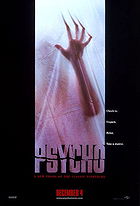 Posted : 15 years, 9 months ago on 20 August 2009 01:29
(A review of Psycho)
Posted : 15 years, 9 months ago on 20 August 2009 01:29
(A review of Psycho) 0 comments, Reply to this entry
0 comments, Reply to this entry
 Login
Login
 Home
Home 183 Lists
183 Lists 1667 Reviews
1667 Reviews Collections
Collections




